MOHAMMED SHEBL 1949-1996: THE LAST REEL
by Samir Raafat
EGYPTIAN GAZETTE, October 10, 1996
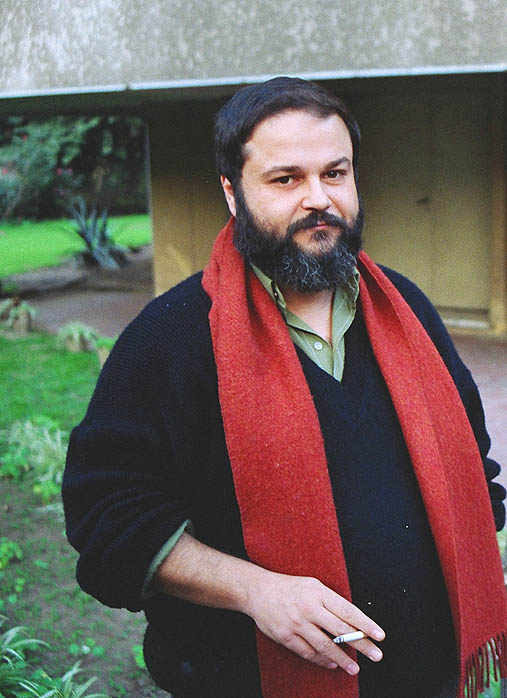
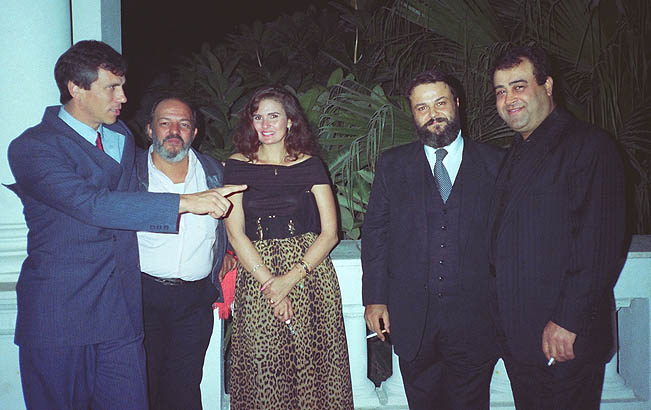
above photos courtesy Pavel Maskin
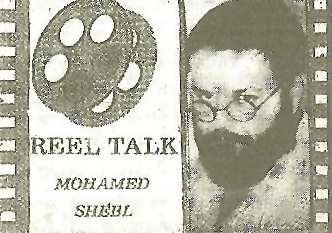
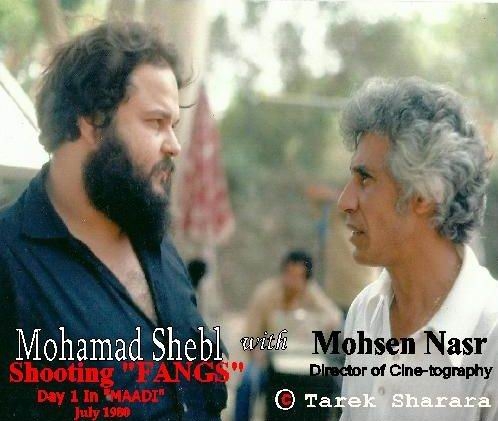
|
|
|
|
|
|
EGY.COM - PERSONALITIES
|
|
MOHAMMED SHEBL 1949-1996: THE LAST REEL
by Samir Raafat
EGYPTIAN GAZETTE, October 10, 1996


above photos courtesy Pavel Maskin


Egyptian Movie director, film critic, talk-show host and radio personality Mohammed Shebl died on October 2, 1996 from cirrhosis of the liver. His films include Anyab (fangs), al-Tawiza (The Talisman), al-Kabous (The Nightmare), Gharam wa Intiqam bel Satour (Love and revenge with a cleaver). A few weeks before he died Mohammed Shebl had attended the Locarno Film Festival where al-Qadiya (The Trial) was screened. This was one of the last works in which Shebl collaborated with film director Youssef Shahin.
Mohammed Shebl and I went to the same school in Maadi and for several years we were in the same grade. Together with our classmate, Serge Walberg, we formed a threesome. While Serge and I were native Maadiites, the Shebl family had arrived from Japan where Mohammed's father had been counselor at the Egyptian Embassy.
Ever since his Tokyo days, Mohammed was enamored with everything Far Eastern. He would occasionally invite us over to his parents' flat on Road 6 for Chinese meals where we ate with chopsticks listening to what sounded like colliding pots and pans and wailing ghosts. "This," Mohammed would inform us condescendingly, "is Madame Butterfly's command performance in Cantonese." Whether it was Cantonese or Burmese it sounded equally awful.
He would invariably show us dwarfy-looking plants and figurines uttering unintelligible words that sounded like "bonzai", "kamikaze" and "kabouki". Nevertheless, despite our disrelish for his oriental food and alcohol-free Saki, Serge and I returned to Mohammed's each weekend. Besides his Sino-Japanese music and suspicious edibles (you must have been really hungry in order to munch whatever it was you were served in lacquered bowls) there was the wonderful Grunding recorder. None of us had seen such a magical contraption before. These were the Nasser days and Egypt was light years behind in telecommunications and sound systems.
I remember how one day we listened in awe to the entire soundtrack of Youssef Shahin's movie "Gamila Bohreid." She was the Algerian freedom fighter who had become a post-colonialism world legend. I think from that time onwards Mohammed was a devoted roadie of Shahin's whom none of us knew, for our movie knowledge was limited to Westerns and American epics, most of which we had seen at the Maadi Sporting Club outdoor cinema. Mohammed on the other hand was quoting Cecil B. de Mille, Fassbinder and von Sternberg. We had no clue at the time that years later Mohammed would himself become a rising movie director.
Ocasionally Mohammed would ostensibly bombast us with stories of his controversial icon Y. Shahin. But then Mohammed loved anything contentious which is why his two first movies (variations of the Rocky Horror Show) were deemed as such by un-merciful critics who failed to understand Shebl's Mephistophelian genre.
It was at Mohammed Shebl's that I also met English historian Arnold Toynbee. He was a friend of Mohammed's father Ambassador Fouad Shebl. One day, Serge Walberg, whose family decided to emigrate to France in 1964, boldly asked Toynbee for a reference to get him into a school in the UK. Toynbee was most obliging and Serge ended up in in a boarding school in Ramsgate, England, which, incidentally, he hated.
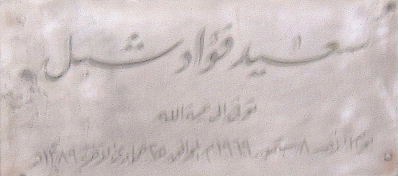
Another person we occasionally ran into at Mohammed's house besides his mother Mrs. Wadood was his older and only sibling. I don't ever recall seeing Saiid Shebl in anything but his pyjamas. He never left the house, most of the time holed up in his room which was off bounds. One day at university we were told that Saiid had committed suicide. Mohammed never spoke of him again. It was as though he had been betrayed or abandoned. From that day onwards Mohammed, now the only son, seldom spoke of his family for that matter.
I recall that a few years before his brother died, Mohammed had left Egypt to join his father somewhere in the Far East and it would be several years before we met again. From the grapevine I learned he was studying Chinese and Russian literature or something equally exotic. This was his Fu Manchu period. Later, still sporting his drooping Chinese mustache, he fascinated me with stories of the Trans-Siberian Express from Moscow to Beijing. That was as good a place as any to practice Russian, Mandarin and Cantonese. Mohammed had a good grasp of all three.
In typical diplobrat fashion Mohammed followed his father's footsteps and spent several months in the United States as a rookie Egyptian diplomat. But his foreign service pursuit somehow took a turn for the worse. He hated the rigidity of officialdom and could not hack the bureaucracy. He had also divorced his young bride.
Released from career and marital obligations he went into music and film.
Mohammed appeared on Radio Cairo's European Service simultaneously hosting talk-shows, plays, and endless retrospects on the Beatles. If anyone knew the size of the Beatles' socks it was Mohammed, for he had become Egypt's foremost authority on the celebrated British pop group.
Ever since Egypt's first groupie band - "The Mass" - was formed in the 1960s Mohammed was right there at the center of Cairo's rock music scene. The Mass, which was composed of Tarek "Ricky" Nour (now Americana), Ashraf Salmawi (presently artist in UK), Mourad Rushdi (accountant in the Gulf), and the Amr Mansour (died from broken spine resulting from bad fall in Club Med's swimming pool), relied on Mohammed Shebl for promotion and the management of its well attended concerts. Mohammed was going to be the group's 'Brian Epstein.'
One of the upsides of driving down Maadi's Corniche was that you could hear Mohammed's voice blasting out from the radio. What better way to start off your 9 to 5 day than listening to the daring and licentious diatribes of Radio Cairo's enfant terrible.
By the late 1980s Mohammed Shebl had become the undisputed star of the breakfast talk-show circuit. By now he had plunged into showbiz, wallet and life savings first. Alas, his first movie bombed depleting him from his financial resources with over 100,000 pounds disappearing out of the window. The showbiz Gods were definitely not on Mohammed's side. His karma ran out on him again when one day the bell rang: "Mohammed Bey, look out of the window, there's been an accident!" He looked and there was his car flattened by a large tree which had decided to commit hara-kiri on Mohammed's brand new un-insured white Mazda. Naturally, it was a Japanese make.
The pile of glass, metal and squashed upholstery was Mohammed's second and last car. From then on it was taxis and auto-stops. Since most of Maadi knew him, hitching a ride into town was no big deal. The number of times I stopped to pick him from in front of his street corner only to drop him half an hour later at the television building were countless. It was during these fortuitous encounters that I had the benefit of a pre-preview to various screenplays or movie scripts. Some were more misanthropic than others. But because of their hilarious characters these rides were among the shortest into town lasting only a few minutes or so it seemed.
One day in 1983 Mohammed asked me to appear as an extra in his movie The Talisman together with our mutual friend the American author and traveler extraordinaire Cassandra Vivian. This was one of the few times I watched Mohammed as he performed behind the camera shouting orders in typical Dom De Luise (Blazing Saddles, 1973) fashion.
It was on one of these random drives ten years later that Mohammed asked me if I had anything publishable for the Egyptian Gazette where he worked at the time. He had been the originator of the refreshing and biting series "Between a Rock and a Hard Place" as well as his by now very famous "Reel Talk". In those days I was writing the occasional article (long rambles, as some of my friends say) for the Ahram Weekly. It was also then that we discussed in earnest the co-production of an Arabic Movie Almanac/Guide which was never realized.
In the days that followed I would slip feature articles under Mohammed's door hoping he would deliver it to the Gazette. I purposefully avoided the bell for fear of being subjected to some more Shahinesque parables or to some experimental Chinese delicatessen. Sometimes he would catch me in the act and I would then be subjected to both. But because of Mohammed's exceptionally good laughs and whimsical stories punctuated with a variety of four letter explicatives, I somehow managed to swallow the 'Shahin Chop Suey.'
Mohammed's perverse, witty, astute, decadent and acerbic interpretations on what was going on around us whether in Egypt or the Middle East was unique. I do not doubt for a minute that 'The World According to Shebl' in book form or screenplay would have been a big commercial success. Certainly much more original than the feeble attempts put out by his better known peers and would-be mentor.
By the time I had the benefit of a regular column in the Egyptian Mail, Mohammed had defected to the competition so that in fact we had simply traded column space. Whenever we would meet after 'the swap' we immediately compared notes. "I have been de-fanged... I am muzzled... I am cast%**d," he would bellow in the car referring to the reduced latitude he had at his new paper. Not at all surprising since at the Gazette he had had absolute editorial freedom which brought out the best and most creative in him. "One day I will return to the Gazette and boy will I give its readers something to chew on." was what Mohammed told me on one of our last rides into town. "Yes, yes, I've heard it all before" was my hurried reply, for I had grown used to Mohammed's moods: up on Mondays and down on Wednesdays interspersed with a lot of "Joe this" and "Shahin that."
During the past 18 months Mohammed had been working on a documentary on "Joe" which meant filming Youssef Shahin on any ordinary day doing the most simple of chores like puffing a cigarette, scratching his hair or reading a newspaper. As though to comfort Mohammed for this strenuous artistic endeavors I would state that when Shahin is gone this will be a winner and perhaps 'one day' you will recoup some of the moneys you lost thanks to his inappropriate advice. I was referring to Mohammed's fated first film which had had the blessings of his mentor but had bombed big time. His replies would be an indifferent or less than enthusiastic "Who knows?" as though he already knew he wouldn't be around to see the fruition of his Shahin labor
Sadly, the 'one day' will never be and even worse, no one has done a documentary on Shebl. As for his resuming "Reel Talk" it never happened. Instead, I find myself with the downhearted task of writing Mohammed's eulogy in "his" Egyptian Gazette for the benefit of his disbelieving fans, friends, neighbors and colleagues none of whom have forgotten his punchy articles, fiery editorials, controversial avant garde movies, hilarious talk-shows and yes, his excellent Beatles retrospects.
As his favorite pop group put it so well in their hit song "Hello, Good-bye" it was now our turn to bid Mohammed Shebl, so long and good-bye.

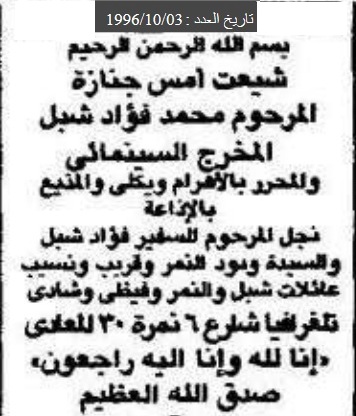
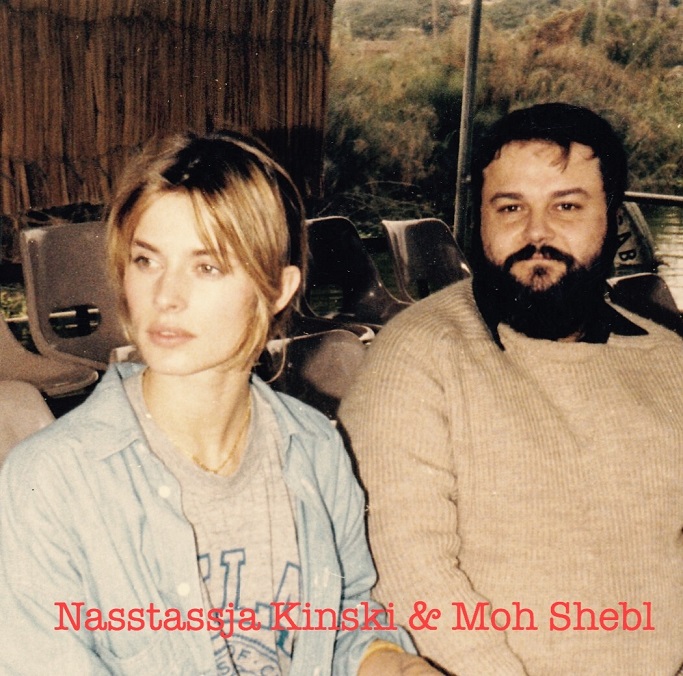
|
Reader Comments |
|
From Maha El-Samadouni Date: Sunday, October 12, 2008 9:55 PM Subject: Growing up nextdoor to Mohammed Shebl 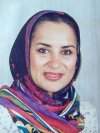 1956 - preteen years. Shortly after my family moved to Seoudi House on Road 6, Maadi, I met Mohammed Shebl. His father Mr. Fouad Shebl and his family had recently moved into the apartment above us. I was one year older than Mohammed and since I did not have brothers he was the closest to that category. 1956 - preteen years. Shortly after my family moved to Seoudi House on Road 6, Maadi, I met Mohammed Shebl. His father Mr. Fouad Shebl and his family had recently moved into the apartment above us. I was one year older than Mohammed and since I did not have brothers he was the closest to that category.
While Mohammed was very popular, Saiid, his older brother was extremely introverted, sensitive and apparently went through every form of teenage crisis. He had a few selected friends, one of them, Youssef, was in the army and if my memory serves me he died during the 1967 War. Another was a guy at the Faculty of Literature, Cairo University, I forgot his name now but what I do remember is that Saiid and his friends were extremely handsome. Mohammed and I shared friends including the two girls living across the street from Seoudi House. I think the youngest was called Amira. She had a blond boyfriend called Hussein who I think lives in Canada now. Amira's sister was overweight and caused trouble for Mohammed and I perhaps because she was jealous of her sister. Seoudi House belonged to the family by the same name. Tante Amina Seoudi lived on the first floor with her granddaughter Noha Haki. Noha’s mother had died young. One of Tante Amina Seoudi's sons, Abdelatif, I think worked for a while at AUC after returning from Austria where he had been a student and where he had taken an Austrian bride, Helen. Her other son, Abdelatif’s nicer brother, remained a bachelor and lived by himself in a studio apartment on the first floor. While I don’t know much about the inheritance distribution after Tante Amina died, I remember that the second floor, where we used to live, was written in the name of Noha's deceased mother. And even though Noha was her only heir I don't think she received anything. Seoudi House consisted of three floors. Each floor had one apartment and each apartment had a balcony facing Road 6. The three families would sit in their respective balconies and chitchat. Naturally the biggest chatters were Mohammed and I probably because we were of the same age. Coming back to Mohammed Shebl's family, Tante Toutou (his mom) was one of the nicest and kindest and most forgiving mothers. After Saiid 's death in 1969 she could not deny Mohammed anything, even when he asked to sell their agricultural land in Mohandessine in order to finance his movie Anyaab. When the movie bombed Tante Toutou laughed and said, “Well it's his money anyway!” Mohammed on the other hand had great expectation for that movie which is why he had some feeling of guilt towards his mom. I remember throughout his teens he had great admiration for the Prince of Darkness i.e. Dracula movies (and Blackula… and any film with a title ending in "...ula"). These movies scared me to death and throughout our teens Mohammed found great joy to scare me with Dracula, Frankenstein and the likes. For instance Mohammed had a horror mask that I hated. Evidently this increased his craving to wear it while talking to me. No matter how I tried to turn my face he still insisted to wear it as if this was the normal thing to do. I would finally scream in his face/mask and threaten to break one of his precious Beatles records on his head if he didn’t remove it. Speaking of the Beatles, Mohammed’s early source of Beatle records was me. My stepfather worked in Saudi Arabia and often traveled with my mom to Europe. Eventually Mohammed became THE authority in Egypt on Beatlemania. One time the Beatles were on their way to India and according to a local daily their plane was scheduled to stop at Cairo Airport. A day later, Mohammed showed me a tuft of brown hair that he kept in a pouch. He claimed it was Ringo's (his favorite Beatle). Stupid me not only believed him but had the ‘audacity’ to ask him to touch the sacred hair. After some begging he "allowed" me the privilege. Naturally it turned out Mohammed had not been able to meet Ringo at Cairo airport and that what he showed me was probably his own hair. But at that time it was more exciting to think it was Ringo's and it also made for a good story at school among my Beatle-crazed friends. Together we used to write down the words of the Beatles’ songs. We would then memorize them daring each other who could recite them faster. Mohammed was in an English School and I was in the Deutsche Schule so naturally he always won. My mom and Tante Toutou took to complaining that if we memorized our schoolwork with the same diligence, we could've passed with high honors. Another time during our teens we went to Maadi Sporting Club’s outdoor cinema to watch a movie on the Marquis de Sade. Half the movie I spent covering my eyes while an overexcited Mohammed laughed loudly to the extent that people around us shhhhushed him and complained to the supervisor. On the way back home Mohammed almost graphically and in gory details described the infamous Marquis and the origin of the word sadism. That night he probably slept with a smile on his face dreaming about de Sade's perversities. Even after my family moved to Giza, Tante Toutou and the Shebl family were sort of like extended family to us. From Amira Hussein Date: Saturday, September 15, 2007 9:55 PM Subject: Mohamed Shebl and Yousef Shahin Thank you for giving us an insight to Mohamed Shebl teen years. It has been almost 11 years since he died but I remember it like yesterday. His invalid mother calling me at 6 in the morning telling me he had passed away. Recuperating his body at Maadi's El Salaam hospital where he had been brought a few hours earlier by a mutual friend George Valopouloss of Jolley's Travel. The hurried service at Maadi's Farouk Mosque with many of his colleagues attending among them Nadia Lotfi, Yussra, Esaad Younes, Tarik Shararra, Ahmed Zaki, Wahid Hamed. Burying him an hour later in his family graveyard under the Citadel. One person whom I think should have been there but wasn't was Youssef Shahin who in the summer of 1996 worked on a movie with Mohamed Shebl. I personally think Mohamed's admiration for Shahin was one way and that although the old director didn't care much for his much younger and very talented disciple he used him for all he was worth. From: Omar I. Metaweh Date: Monday, August 06, 2007 6:35 PM Subject: Shebl It was amusing to hear your description of Mohammed as a Dom De Luise behind the camera! I worked with "Chips" doing the soundtrack for El Tawiza @ Ballad El Cinema and the media building in downtown Cairo as well as @ Mohammed's home at Maadi's Road Six. We often argued while working on Tawiza but then came up with some very good artistic collaboration. I recall that Shebl was concerned as to what the censorship bureau would do with the final version of the film once production was completed but I understand they did not cut too much. I have yet to see this movie as I had to leave Egypt shortly after we completed the post production work. In fact I’m still attempting to get hold of its DVD. Shebl and I did several radio programs together on Radio Cairo's European Service. Since I currently compose music of various forms including jazz-rock fusion I endeavored to send Mohammed some new recordings. It was disheartening to learn of his passing and I was profoundly saddened by this event. I know I have several Radio Cairo recordings archived so will check my library to see if I can find the shows that we did together. I’m currently working on an art exhibition to be presented here in Naples, Florida. I hope to convince the orchestra to perform one of my recent compositions "Destination Thebes". By the way, I remember Cassandra Vivian. Omar Ibrahim Metaweh from the Sunshine State, USA 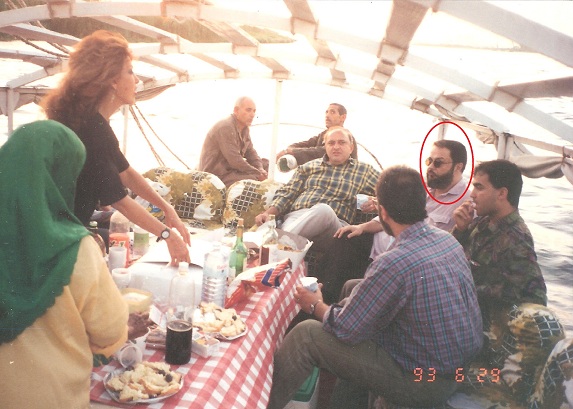 a relaxed moment on a June 1993 Nile felouka outing organized by radio announcer collegaue Raja Nachat 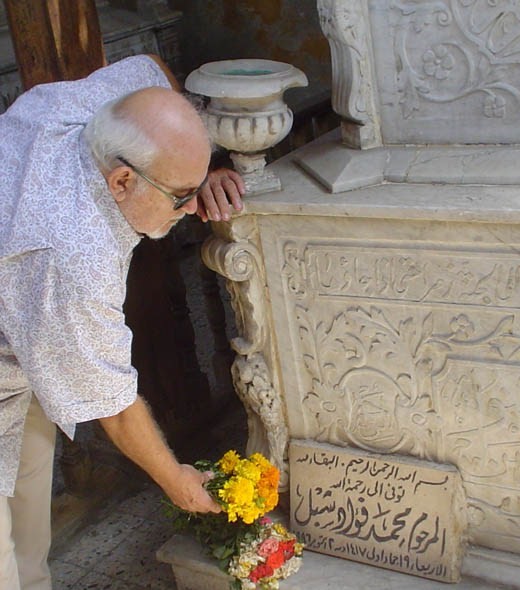 Tarek Sharara laying flowers on Shebl's 12th anniversary (2 October 2008) Mohammed Fouad Shebl rests with his maternal great-great-grandfather Mustafa Amin son of Ali Agha al-Avlonyali
Subject: Remembering Mohamed Shebl Date: Mon, 6 Aug 2007 20:09:14 +0200 From: Tarek Sharara One of Mohammed Shebl’s disappointments was the poor reviews of his horror movie Aniab (Fangs; 1981) starring popular singers Ahmed Adawia and Ali al-Haggar as vampires with screenplay written by Mohammed Shebl and myself based on the Rocky Horror Picture Show. Mohammed directed as well as produced this movie investing his entire savings. What a shame he is not with us today to witness how Aniab became a widely acclaimed cult movie its music (Moody al-Imam) being played again and again on various music channels. Mohammed was born 14 July 1949. He did not make it to 50. What a shame! Subject: Remembering Mohamed Shebl Date: Mon, 15 Aug 2005 19:09:14 +0400 From: Pavel Maskin
My dear friend !
Mbr
It is pity to know almost ten yours later that my friend Mohamed has gone.
Subject: Mohammed Date: Thu, 2 Oct 1997 14:49:30 +0200 From: Maria Golia Mohammed was one of Cairo's crustier journalists. Appreciated for his scathing sarcasm, he wrote with irreverent verve about any number of Cairene incongruities and specialized on the inner workings of Egypt's cinema scene. He spoke Russian, Chinese, Arabic and English, was a Beatlemaniac and a fine cook. He lived with his mother who despite a lengthy, debilitating illness, survived her son. Mohammed died, to the shock and dismay of his many friends, in his early forties. I met one of his former colleagues at a party. Heba is a young woman of astonishing delicacy. Her voice is soft, her manner soothing and her profile is something you might see struck onto golden coins. She had had a disturbing dream about Mohammed and related it to us. "I was attending a seminar and suddenly, I ran into Mohammed. I was so very embarrassed, because of course, I knew he was dead". Heba covers her mouth with her hand and casts long lashes down a creamy cheek before continuing. "I stuttered a bit searching for words and found myself saying, 'Mohammed, you had the most glowing obituaries!'" Heba laughs now with her audience who, knowing the man and the artist's fondness for praise, found her comment most fitting. "But wait", she said,"Mohammed had the last laugh. He said: 'I heard!!'!". More appreciative laughs. We all knew he was a bit of a gossip. "But it doesn't stop there" she went on, "he asked me to do him a favor. He needed some research to answer a question he had. Of course I agreed, but I asked him how could I get him the information? He said, 'Just tell as many people as you can. It's bound to get back to me'". Everyone was in paroxysms at this point, the laughter of recognition, of relief that it wasn't me, the laughter that stalls the fear of all of us potential messengers to Mohammed.
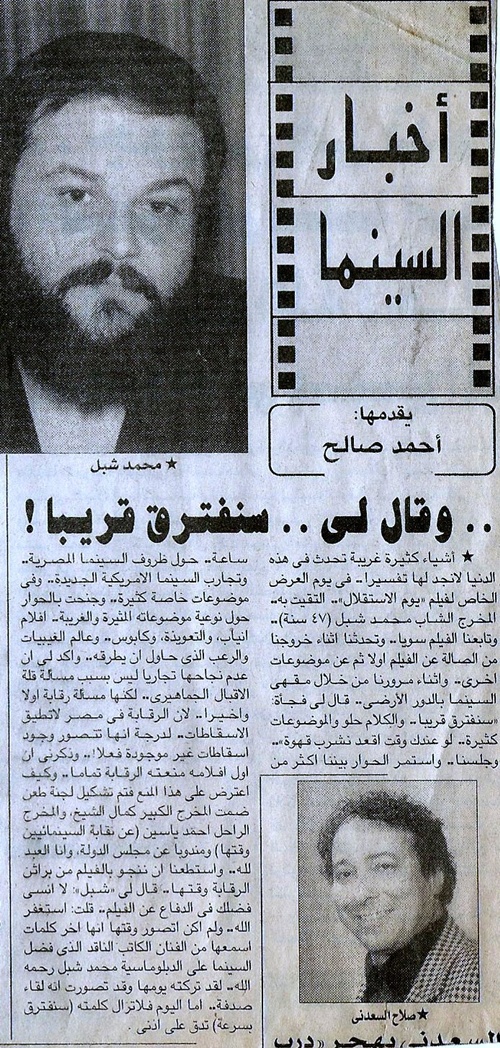
|
|
|
|
|